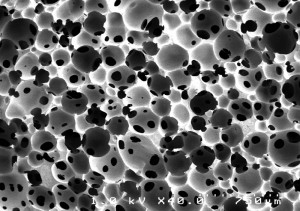‘Yo-Yo Dieting’ May Cause Metabolic Dysfunction
The cycles of weight loss and gain that accompany “yo-yo dieting” increase the risk of developing Type 2 diabetes and cardiovascular disease. However, exactly how weight cycling increases metabolic dysfunction—more than steady weight gain alone—is unknown.

Alyssa Hasty, PhD’98, associate professor of molecular physiology and biophysics; Emily Anderson, PhD’13; and colleagues studied mice that were cycled between high- and low-fat diets to determine if weight cycling alters adipose (fat) tissue immune-cell accumulation, inflammation and insulin resistance—factors that are known to contribute to the development of obesity-related disorders.
They report in the journal Diabetes that weight-cycled mice had decreased systemic glucose tolerance and impaired adipose-tissue insulin sensitivity compared to mice that gained weight but did not cycle. Weight cycling increased the numbers of certain T cells and the expression of pro-inflammatory factors in adipose tissue.
The studies suggest that an exaggerated immune response in adipose tissue may contribute to metabolic dysfunction during weight cycling. This immune response may offer a therapeutic target for preventing obesity-related disorders.
This research was supported by a grant from the National Institutes of Health. Hasty was also supported by an American Diabetes Association Career Development Award and an American Heart Association Established Investigator Award.
Synthetic Foam Could Treat Deep Skin Wounds
A pair of Vanderbilt graduate students has received a national award of $15,000 to pursue development of a synthetic foam as a treatment for deep skin wounds such as chronic foot ulcers caused by diabetes.
Drew Harmata and Jon Page, graduate students working in the laboratory of Scott Guelcher, associate professor of chemical and biomolecular engineering, were among nine student teams that received awards in the second stage of the National Collegiate Inventors and Innovators Alliance’s E-Team program. They qualified to compete in the third stage of the competition next year when they will have the opportunity to pitch their innovations to investors and can receive an investment up to $50,000.

According to Guelcher, the lysine-based polyurethane material was originally developed by a Japanese company as a clear coat for automobiles, but proved too expensive for that application. However, the material had an unusual property that set it apart from forms of polyurethane used in floor coatings and electrical insulation: It is nontoxic and biodegradable.
“We’ve been working with this material for seven or eight years,” says Guelcher. “We’ve tested it for a large number of applications and have applied for several patents.”
One of their discoveries—made in collaboration with Jeff Davidson, professor of pathology, microbiology and immunology, and Lillian Nanney, BA’73, professor of plastic surgery and cell and developmental biology—was that the material is particularly effective at treating deep cutaneous wounds and potentially chronic foot ulcers, which are responsible for more hospitalizations than any other diabetes complication.
To treat such a deep wound, the rigid foam is shaped so it fits snugly into the defect. Once inserted, the material serves as a scaffold that holds and directs new tissue as it grows into the opening. As healthy cells spread, the foam degrades until it disappears completely when the wound is filled in.
Team Examines Health Information Cybersecurity
M. Eric Johnson, dean of Vanderbilt’s Owen Graduate School of Management and the Bruce D. Henderson Professor of Management, has been named principal co-investigator on a new $10 million, five-year grant from the Secure and Trustworthy Cyberspace program of the National Science Foundation (NSF). The grant will support research investigating ways to protect patient confidentiality and privacy as health organizations move more toward the use of electronic medical records.
“Cybersecurity is one of the most significant economic and national security challenges facing our nation today,” says Farnam Jahanian, NSF’s assistant director for computer and information science and engineering.

Researchers at Vanderbilt—alongside colleagues at Dartmouth College, the University of Illinois, Johns Hopkins University, and the University of Michigan—will examine the impact of IT investments on the effectiveness of hospital security programs. The team will do this by analyzing data collected on the prevalence of malware, combined with data on hospital security programs. Using economic game-theory models, the researchers will also examine how organizational incentives, penalties and audits impact user behavior and hospital privacy performance.
In alignment with themes outlined in the 2011 Strategic Plan for the Federal Cybersecurity Research and Development Program, these efforts will build on NSF’s long history of advancing cybersecurity.
Johnson, who became Owen’s dean July 1, is an expert on the impact of information technology. “Vanderbilt is delighted to be part of this outstanding multi-institution team,” he says. Johnson’s most recent book is The Economics of Financial and Medical Identity Theft (2012, Springer), which examines the security failures and economic incentives that drive identity theft.